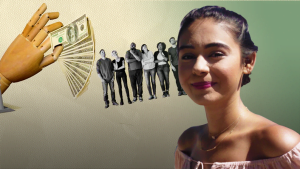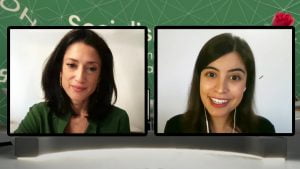
Socialism: Is the Pandemic a Catalyst for Radical Change?
For many, COVID-19 has exposed the structural inequality in our societies, with young people being disproportionately affected. This debate focuses on the core principles on which societies can be built culturally and economically and considers the merits of capitalism and socialism, putting economic models and concepts such as ‘creative destruction’ in light of the current crisis. Through this unit, learners examine these core economic systems of governance by engaging with a diverse range of opinions on a sharp spectrum.
01. What We Know about Socialism and Capitalism
Is socialism the pandemic fix we need?
What are the strengths and weaknesses of socialism and capitalism in today’s society?
In this activity, you will work toward a broader understanding of socialism and capitalism before watching the debate.
- Start by brainstorming everything you know about both systems. Think about the historical context surrounding the rise of each, purposes, countries where one system or the other prevails, the rules of the game for each, social implications, etc. Use post-it notes on two separate pages to share the brainstorming process with peers and pool your knowledge on each system.
- Now watch the short video to the left. What points did this add to your knowledge so far?
- What would you say are the strengths and weaknesses of each system based on what you know?
- What further questions does all of this raise for you?
- What are your personal views on the relevance of each of these systems right now in the world?
02. Watching the Debate and Understanding the Positions
Is the pandemic a catalyst for radical change?
What are the speakers’ positions on capitalism and socialism in today’s world, and is there common ground among them?
Listen to the speakers’ position statements early in the debate (7:20-14:48).
- Write down the points you agree on and those you don’t for each speaker.
- With which speaker do you most strongly agree and why?
- Read the bios for each speaker. How do you think each one’s life experience might shape their positions?
- Imagine their positions as the tip of an iceberg – the part we see – and the interests underlying those positions as the larger base – the part below the surface that we don’t see. What interests do you think underlie each speaker’s position?
- Do you notice any common interests behind their positions?
03. Socialism or Capitalism: Where Do I Stand?
Free Money From the Government: Universal Basic Income
Is the pandemic a catalyst for radical change?
As you listen to the speakers defend their viewpoints throughout the debate, consider how you engage in tough conversations about controversial topics. Watch the video Master Listening from our Better Conversations module to build your listening skills for the following questions.
- Which issues has the pandemic cast in stark relief, according to the speakers?
- Find a partner – ideally someone you do not agree with – to apply your listening skills in a discussion of where you each stand on the topic of the video profiled here: universal basic income.
- Did active listening make your discussion more productive than expected?
- Do you believe we are at a pivotal moment of change on the issues the pandemic has highlighted, or will the world go back to business as usual after it’s all over? Explain your answer.
04. The Majlis and Finding Common Ground
Is the pandemic a catalyst for radical change?
How can we shift our focus from strong disagreement to what we do agree on?
Watch the Majlis and Connector segments of the debate (20:06-41:02).
- Where did the speakers find common ground and how?
- Where were the speakers unable to find consensus?
- Are there ways you think they could shape the discussion in order to find common ground?
- Based on Dr. Clayton’s observations about moving from generalities to specifics, how could speaking about specific policy changes be more productive than referring to capitalism or socialism in this debate?
05. The Invisibles
The Invisibles
How can we reflect on the debate and look at aspects of socialism and capitalism in more concrete terms that play out in real life?
Watch the short film, The Invisibles, for a more on-the-ground discussion of this debate topic.
- How does the video reflect the impact of capitalism on these workers?
- How has the pandemic exposed some of the “holes” in the system?
- What aspects of socialism are raised in the video?
- What are the overlapping complex global issues present here?
- How do you think this film is relevant to the capitalism/socialism debate?
06. Taking Action for Change
How can young people contribute to the social, political and economic debates and movements around inequity in their communities?
The impact of the pandemic on the lives of young adults was especially highlighted in this debate. Now put everything you’ve learned in this debate and solutions you imagined to work and take action. Here are some ideas.
- Write a speech to present at the UN or a letter to the editor of a major newspaper.
- Design a public mural or performance art promoting your call for change.
- Identify organizations already advocating in the direction you want to go and how to bring them together around your common message.
- Design an awareness campaign to pilot at your school or university about better conversation skills to break the polarization and change the conversation.
- Submit a candidate for our #SolvingIt series to promote a changemaker in your community!







